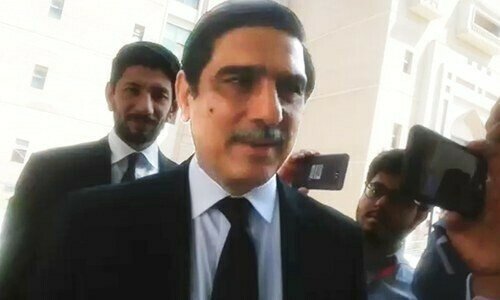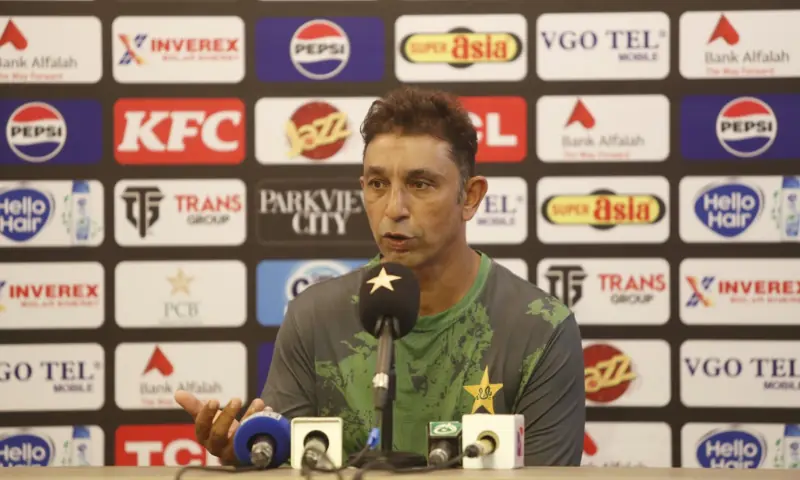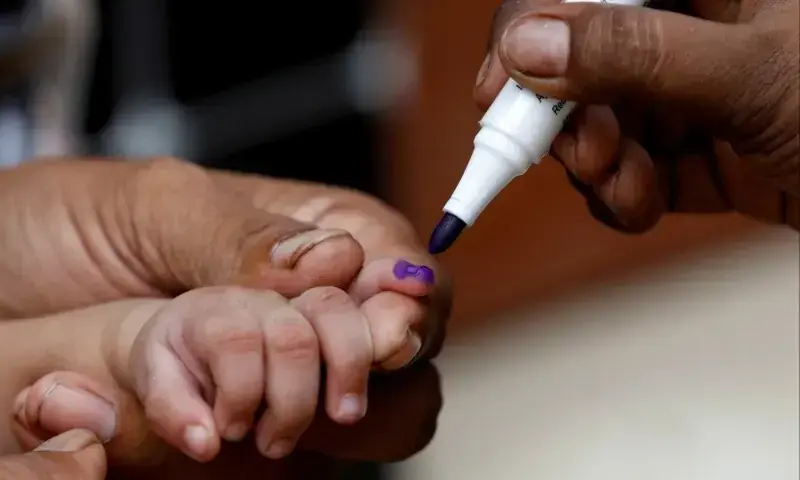Ministry of Defense lawyer Khawaja Haris informed the Constitutional Chamber of the Supreme Court on Tuesday that the alleged masterminds and conspirators of the May 9 “conspiracy” would be tried in military courts.
The court, which includes Justices Aminuddin Khan, Naeem Akhtar Afghan, Jamal Khan Mandokhail, Muhammad Ali Mazhar, Hassan Azhar Rizvi, Musarrat Hilali and Shahid Bilal Hassan, is hearing a case related to the military trials (and recent sentences) of civilians for their role in attacks on army installations during the unrest following the arrest of former Prime Minister Imran Khan on May 9, 2023.
In recent hearings, Supreme Court judges have questioned why the accused were “specifically” tried in military courts rather than anti-terrorism courts, with Justice Mandokhail observing that “the executive cannot play the role of the judiciary.”
A day ago, Justice Hilali wondered whether the Pakistan Army Act (PAA) 1952 provided for any punishment for officers who flouted the Constitution.
During today’s hearing, lawyer Haris, appearing as a lawyer for the Ministry of Defense, responded to a question that the trials of the conspirators and masterminds would also be held in military courts.
Continuing his arguments yesterday, the defense ministry’s lawyer presented the case of Sheikh Liaquat Hussain as an example of a civilian being tried in a military court.
Justice Rizvi asked whether an army officer was tried for his involvement in the events of May 9.
“How did people get to the corps commander’s house without weapons?” he asked, calling the intrusion a “security failure.”
In his response, the lawyer said that the accusation against the people was for damage to property, and added that no soldier was tried in the events that occurred in 2023.
However, Justice Mandokhail said the court wanted to look at the circumstances under which a civilian was tried under the Army Act, questioning its jurisdiction.
“The extent to which the scope of the Army Law is being expanded, [means] “Anyone can be tried under it,” he said.
the audience
At the beginning of today’s hearing, the defense lawyer presented the example of Sheikh Liaquat Hussain’s case as a civilian tried by a military court.
In response, Judge Mandokhail said what had to be determined was under what circumstances a civilian could be tried in a military court.
“The trial for preventing an army officer from doing his job by incitement will be conducted under the Army Act,” Haris said, adding that the SC had ruled in the past that army personnel after retirement should be considered civil.
Justice Mandokhail said the entire defense case hinged on Brigadier FB Ali’s case, in which a retired military officer was tried in a military court as a civilian.
The defense attorney said both serving and retired army officers were tried in the case.
“Is anyone accused of inciting the military not to work on this case?” Justice Manodkhail asked, adding that the action would only be considered criminal if an officer registered a complaint or participated in the incident.
“Anyone who disturbs the discipline of the army would go to military courts,” Haris said.
In response, Justice Mandokhail asked whether attacking an army convoy was also considered a “breach of discipline”.
“If a soldier has a dispute with a civilian at a checkpoint, would this be considered a disturbance?” Judge Hilali asked.
“To the extent that the scope of the Army Act is expanded, anyone can be tried under it,” Justice Mandokhail said.
Justice Rizvi reminded the lawyer that the FB Ali case was tried under martial law.
“Zulfikar Ali Bhutto was the administrator of civil martial law at that time,” Justice Rizvi said, adding that the case was filed in an attempt to remove the former prime minister.
“Martial law ended after the constitution was drafted,” Justice Rizvi said.
“It is true, but the court order does not mention the imposition of emergency,” Haris responded, adding that the people prosecuted in the FB Ali case were retired.
“If a soldier has a disagreement with a civilian in a cantonment area, where would the case go?” Justice Hilali asked.
To this, the defense attorney responded that “disagreements” were a completely different matter.
Justice Mandokhail said the issue of military trials had expanded beyond his scope.
The defense lawyer said the trial of a civilian for interfering in military affairs, even in peacetime, would take place in military courts.
“After all, there must be a mastermind who hatched the conspiracy?” Justice Rizvi asked.
In response, the defense lawyer said the mastermind’s trial would also be held in military courts, adding that the law had been in force since 1967 and that the issue of civilian trials in military courts was not “suddenly happening.” .
Justice Mandokhail noted: “Associate [something] with an army officer and committing a crime against the army are separate things.”
“If I use the word association, it is necessary to have an association,” he added, asking if the two were related to the crime that was committed.
Haris responded that an association does not necessarily mean “friends or family”, adding that this had also been discussed in detail in the FB Ali case.
“It is also related to discipline,” he said.
“The association is with a person, not with property,” Justice Mandokhail replied.
“If an ordinary citizen steals for his own benefit, will he go to a military court or somewhere else?” Judge Hilali asked.
“The capture of a foreign spy is also included in the Official Secrets Act,” Judge Mazhar noted.
“There were a lot of May 9 protesters who didn’t know what to do,” Judge Hilali said.
“FB Ali was accused of colluding with some people within the institution,” Justice Mandokhail responded, adding that it was necessary to prove a link with someone working within the institution.
“Khawaja, I have a partnership with you,” Justice Mandokhail said. “The mere fact of having this association will not constitute our collusion in any of its cases.
“We will have to say if we were involved in the crime that was committed,” he remarked, adding that this is an important point.
“If I go to a defense institution and steal a weapon there, the trial for it will also take place there.” [military court]”Haris responded.
“In the theft of weapons, how will it be demonstrated that the matter has an internal relationship?” Judge Mandokhail asked.
“Stealing the weapon that the soldier is supposed to fight battles with would prevent him from working,” Haris said.
“Then tell me, where will the FIR of gun theft be registered?” Judge Mazhar asked.
“And many people were [going inside military installation] on May 9, it is said that they knew nothing,” said Judge Hilali.
“All these people were not tried by a military court,” Haris said, adding that he would present the details of the accused.
“Without discipline, the army cannot wage wars,” he said, noting that “obstruction of the army’s functions is also a violation of discipline.”
Justice Mandokhail questioned to what extent the law could be expanded.
“ATA [Anti-Terrorism Act] “It is a stricter law than the Army Law,” he stated. “In ATA the punishments are stricter and there are no concessions.”
The hearing was then adjourned until tomorrow.
On December 13, the Constitutional Chamber conditionally allowed military courts to pronounce reserved verdicts on 85 civilians who were detained for their alleged participation in the riots of May 9, 2023.
On December 21, military courts sentenced 25 civilians to prison terms of between two and ten years for their role in the attacks. Days later, 60 other civilians were sentenced to prison terms of similar length in the matter.
On January 2, the clemency petitions of 19 defendants were accepted on humanitarian grounds, while another 48 petitions have been processed before the Courts of Appeal.
The sentencing of civilians by military courts was not only condemned by the PTI, but the United States, the United Kingdom and the European Union also expressed concern, saying the move contradicted international laws.








